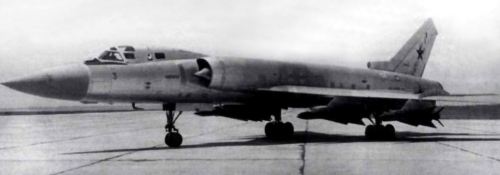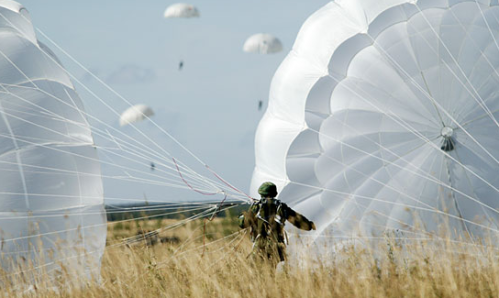In Voyenno-promyshlennyy kuryer on 10 February, Aleksey Mikhaylov gives us details on the career of new GRU Chief General-Lieutenant Igor Korobov, and perspective on issues he needs to resolve for GRU Spetsnaz forces.
Mikhaylov writes that Korobov’s appointment continues a tradition from the end of the 1990s: the first deputy chief for strategic [agent] intelligence becomes the new head of the GRU. His immediate predecessors — the late Igor Sergun and Aleksandr Shlyakhturov — were both “strat guys.”
As for Korobov, he matriculated at the Stavropol Higher Air Defense Aviation School in 1973 (making him about 61). Graduating with distinction in 1977, the new lieutenant headed north to serve at Talagi airfield near Arkhangelsk in the 518th Interceptor Regiment — part of the 10th Independent Air Defense Army.
Korobov’s regiment flew large, long-range Tu-128 / Fiddler interceptors with the mission of engaging U.S. B-52 bombers in the Arctic.

Tu-128 / Fiddler
In 1981, according to Mikhaylov, Korobov was accepted into the Military-Diplomatic Academy — the GRU’s training ground.
It’s worth noting that bmpd.livejournal.com ran a lengthy item on 7 February with several photos from Korobov’s days in Stavropol and Talagi. It adds that he served in the 2nd squadron of his regiment.
In 1980, a “buyer” arrived from Moscow to talk to the regimental commander and review files of young officers. He picked two candidates — Viktor Anokhin and Korobov. Anokhin demurred because he wanted to fly, but Korobov accepted. The former went on to become a two-star in the Air Forces. The latter began his career in the GRU.
All this explains how Korobov came to have blue piping on his dress jacket and epaulettes.
But back to Mikhaylov . . . . The GRU, he writes, is associated primarily with “illegals” and “foreign residencies” which acquire information on the latest developments in the military-industrial complex of the “probable enemy,” the deployment and armament of his forces, and “nuclear secrets.” It also has directorates specializing in electronic and space reconnaissance, cryptanalysis, etc.
He continues:
“At the same time, the GRU also answers for the deployment and TO&E structure of army reconnaissance sub-units subordinate to the reconnaissance directorate of the Ground Troops.”
“After special designation [Spetsnaz] brigades that transferred to the Main Command of the Ground Troops during the transition to the new profile [under former Defense Minister Serdyukov] returned to the GRU, the Command of Special Operations Forces [SSO] also went into the structure of the directorate [GRU], according to some reports. So besides strategic, electronic, and space intelligence, the head of the GRU and his subordinates have to work with Spetsnaz units and sub-units, and SSO Centers, and participate in the reorganization of the reconnaissance elements of the Ground Troops, Navy, and VDV.”
Mikhaylov asked Spetsnaz officers about the problems of their branch, and ways to solve them. The majority, he writes, think the Spetsnaz still suffer from reforms instituted by Serdyukov. Its commanders know how to lead, but not necessarily how to conduct reconnaissance operations.
Experienced Spetsnaz commanders lost in Serdyukov’s time have been replaced by officers who don’t understand reconnaissance, according to Mikhaylov’s interlocutors. They call for better cooperation between the GRU and Main Command.
At present, in Ground Troops brigades, force reconnaissance sub-units are being established — companies in reconnaissance battalions of combined arms brigades and Spetsnaz battalions in army reconnaissance brigades. But it’s not just structure, but also the particulars of employing these new Spetsnaz sub-units that need to be developed, Mikhaylov writes.
Several of his sources say Spetsnaz units and sub-units have become too numerous, at the expense of electronic reconnaissance.
Mikhaylov adds that Spetsnaz operations in the enemy’s rear areas require aviation assets, helicopters in particular. But it’s unclear who will provide this air support. Other officers, however, contend that modern specialized armored vehicles like the Tigr are sufficient for most operations in which Russian forces are likely to find themselves. But reconnaissance battalions and brigades need more UAVs, and greater numbers of advanced electronic reconnaissance systems, another Ground Troops officer told Mikhaylov.
Combined arms reconnaissance has one more headache — recently formed sniper companies for which the brigade’s chief of reconnaissance is responsible. One sniper officer told Mikhaylov that these companies already exist though without guidance, regulations, or combat training plans.
In conclusion, Mikhaylov concedes that new GRU Chief Korobov won’t have to deal with these problems personally, but his subordinates will.
This all becomes even more interesting if you consider that the GRU, SSO, and army reconnaissance Mikhaylov describes have probably deployed on battlefields in Ukraine and Syria without sorting out their unresolved organizational and operational issues first.




